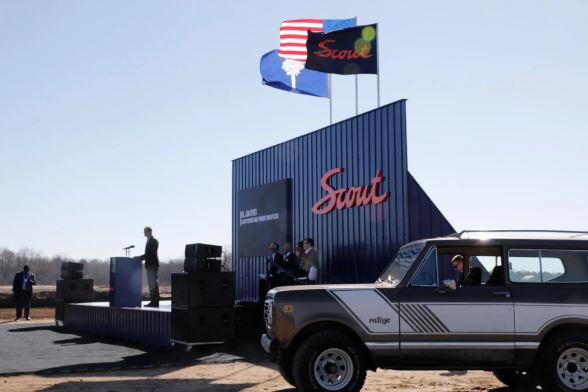Volkswagen, once synonymous with iconic models like the Beetle and the Microbus, is embarking on a nostalgic journey in the United States, hoping to recapture its former glory with a modern twist: electric vehicles. The German automaker, ranked second globally only to Toyota, has been a niche player in the American market but is now seeking a significant resurgence.
The company’s strategy hinges on leveraging the nostalgia associated with past successes like the Beetle and the Microbus while embracing the electric revolution sweeping the automotive industry. Volkswagen’s latest electric model, the ID.Buzz, bears a striking resemblance to the beloved Microbus, evoking memories of an era gone by.
Last week, Volkswagen marked a significant milestone with the inauguration of a factory site near Columbia, S.C., where vehicles sporting the Scout badge will be manufactured for the first time since 1980. This move signals Volkswagen’s intent to delve into the electric pickup and SUV market, aiming to cater to evolving consumer preferences and capitalize on the shifting automotive landscape.
Volkswagen’s ambitious plans align with a broader trend among foreign automakers, viewing electric vehicles as a means to challenge established players in the United States. With aspirations to at least double its market share in the country by the end of the decade, Volkswagen is betting big on electric vehicles as a pivotal driver of its growth strategy.
Arno Antlitz, Volkswagen’s chief financial officer, underscored the significance of the electric transition, emphasizing that the automotive landscape is undergoing a fundamental shift towards electrification. Against this backdrop, Volkswagen sees a unique opportunity to expand its presence in the American market and establish itself as a dominant player in the electric vehicle segment.
The rise of electric vehicles has already disrupted industry rankings, empowering foreign automakers like Volkswagen to challenge incumbents. Hyundai, for instance, propelled by its electric SUVs and sedans, surpassed Stellantis to become the fourth-largest carmaker by sales in the United States last year. Electric vehicles not only enhance brand perception but also attract a more affluent and discerning customer base.
However, Volkswagen’s quest for dominance in the United States won’t be without challenges. The company has faced hurdles in the past, and skeptics question whether its latest endeavor will yield different results. Michelle Krebs, an executive analyst at Cox Automotive, remains cautious, citing Volkswagen’s previous attempts to penetrate the American market.
Yet, Volkswagen’s pivot towards electrification stems from lessons learned, particularly in the aftermath of the diesel emissions scandal that tarnished its reputation. The debacle prompted Volkswagen to embrace electric vehicle technology early on, positioning itself as a frontrunner in the electric vehicle race.
Pablo Di Si, president of Volkswagen Group of America, spearheads the company’s ambitious growth agenda in the United States. Drawing from his successful tenure in Brazil, where Volkswagen significantly expanded its market share, Di Si emphasizes a strategic approach tailored to future market trends.
Volkswagen’s investment in electric vehicle production facilities underscores its commitment to the American market. The construction of a $5 billion factory in Ontario, alongside existing facilities in Chattanooga, Tenn., and Puebla, Mexico, reflects Volkswagen’s ambition to localize production and leverage federal incentives for electric vehicle buyers.
Reviving the Scout brand fills a crucial gap in Volkswagen’s product lineup, targeting a segment dominated by American brands like Chevrolet and Ford. By reintroducing Scout, Volkswagen aims to appeal to consumers seeking off-road-capable vehicles while maintaining its distinctive identity and heritage.
As Volkswagen charts its course for the future, the company’s success in the United States holds broader implications for its global strategy. With a robust presence in Europe and China, Volkswagen views growth in the United States as imperative to maintaining its position as a leading global automaker.
Scott Keogh, CEO of Volkswagen’s Scout Motors division, emphasizes the strategic importance of a strong foothold in the United States, stressing the company’s aspiration for a well-rounded global footprint.
Volkswagen’s journey towards electrification represents a pivotal chapter in its storied history, blending nostalgia with innovation as it seeks to redefine its legacy in the American automotive market. As the electric vehicle revolution gathers momentum, Volkswagen stands poised to write a new chapter in its American saga.

